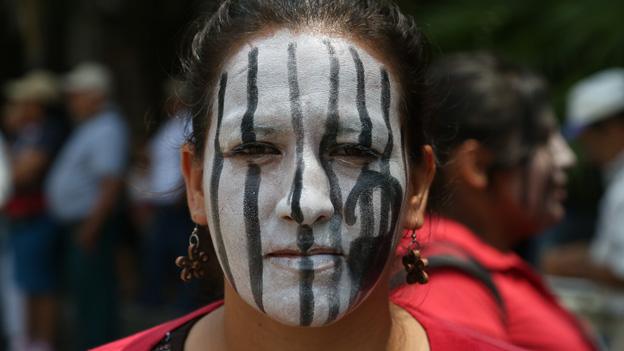El Salvador woman cleared over baby's death says 'justice was done'
- Published
Evelyn Hernández thanked her mother after being cleared
A 21-year-old woman acquitted of the aggravated murder of her baby in El Salvador has called on her supporters to fight for others like her.
A judge said there was no evidence that Evelyn Hernández had killed her child, which was found dead in the septic tank of the toilet where she gave birth.
His ruling overturned the verdict of a 2017 trial, when Ms Hernández was found guilty and sentenced to 30 years.
Women's groups hope the ruling will set a precedent for other jailed women.
"I ask that justice and freedom be done for the other women," Ms Hernández said, referring to at least 17 women who are currently in jail over similar cases.
El Salvador has one of the strictest anti-abortion laws in the world. Abortion is illegal in all circumstances and those found guilty face between two and eight years in jail.
But in many instances, including the case against Ms Hernández, the charge is changed to one of aggravated homicide, which carries a minimum sentence of 30 years.
What was Ms Hernández accused of?
Evelyn Hernández was charged with aggravated murder, with prosecutors arguing that she had killed her baby in 2016.
She has always maintained her innocence, saying that she had been raped by a gang member and had no idea that she was pregnant.
Evelyn Hernández spoke to the BBC last year
Ms Hernández says that on 6 April 2016, when she was 18, she experienced severe stomach pains and bleeding while at her home in rural El Salvador.
When she went to the toilet, located in an outhouse, she fainted. Her mother took her to a hospital, where doctors found she had given birth.
She was arrested after the body of her baby was found in the toilet's septic tank.
She was originally charged with inducing an abortion, which is illegal in El Salvador. That charge was later changed to aggravated murder, and she was sentenced to 30 years in prison in July 2017.
Her lawyers appealed against the sentence, arguing that forensic evidence showed that the baby had died of meconium aspiration, inhaling his own early stool.
This can happen while the baby is still in the uterus, during delivery or immediately after birth – casting doubt on the prosecution's argument that the baby had died from inhaling faeces inside the septic tank.
Ms Hernández served 33 months in jail before her appeal was successful and a retrial was ordered. She was released from prison in February pending her retrial.
What happened at the retrial?
Prosecutors argued that she was guilty of murdering her baby "by omission" and asked for an even harsher sentence - 40 years in prison - than that imposed in the original trial.
Evelyn Hernández again maintained that she did not induce an abortion as she had not even been aware that she was pregnant.
She said she had confused the symptoms of pregnancy with stomach ache because she had experienced intermittent bleeding, which she thought was her menstrual period.
"If I'd known I was pregnant I would have awaited [the birth] with pride and joy," she has said in the past. Her lawyers argued she should be cleared.
On Monday, Judge José Virgilio Jurado Martínez said that there was no evidence that a crime had been committed and acquitted Ms Hernández.
The prosecution has 10 days to appeal against the verdict.
What has the reaction been?
Ms Hernández was visibly relieved and emotional after the verdict was read out, embracing her lawyer, Bertha María Deleón, and other activists.
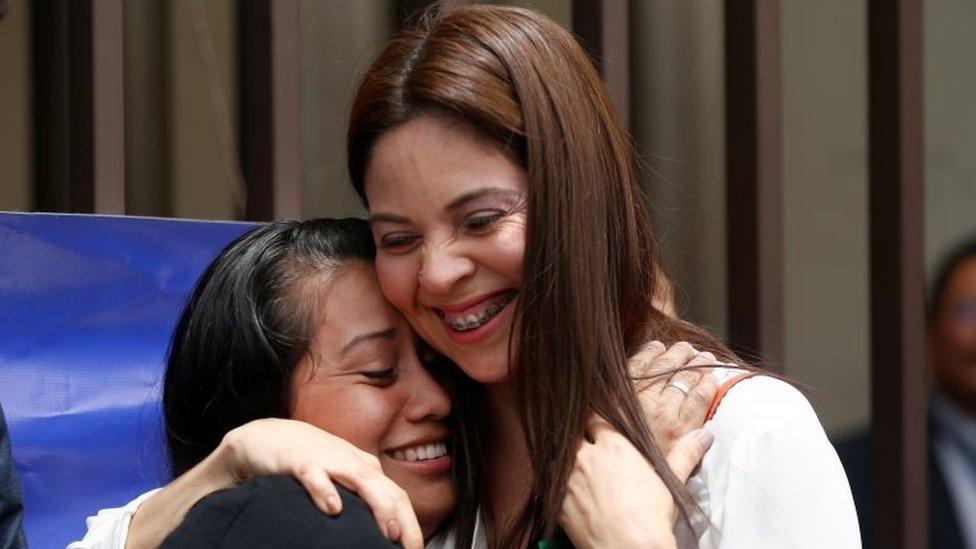
Evelyn Hernández hugged her lawyer Bertha Deleón after being cleared of murder
"Thank God, justice was done," she said before thanking everyone who had supported her.
"I also thank my mother for always being with me in everything, I know it's been tough all this time, being there [in the courtroom] and seeing how I was being accused of something I was innocent of," she said in a brief speech outside the courtroom.
"My future is to keep studying and achieve my goals," she said to cheers from those gathered. "There are many women who are still locked up and I call for them to be freed soon, too," she added.
Ms Deleón also called on those gathered outside the courtroom to continue fighting for the release of women convicted under similar circumstances.
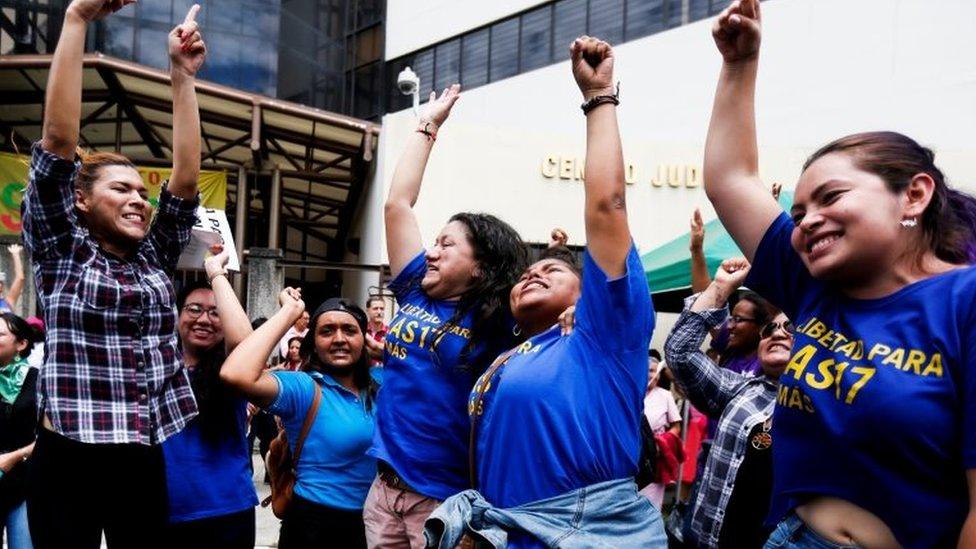
Women's rights activists were delighted when Ms Hernández was acquitted
"We can't lose sight [of that fact that] there are more women who are being held due to injustice, we are advancing and we want - as we managed to obtain Evelyn's freedom - to continue fighting to free the others," she said.
Human rights lawyer Paula Avila-Guillén, who acted as an advisor to Ms Hernández's legal team, said that the ruling would not only help create a judicial precedent but also "help create a more favourable public opinion, a public opinion that understands the total abortion ban and its wrongful application".
Amnesty International described the verdict as a "resounding victory for the rights of women in El Salvador" and called on El Salvador's government to "end the shameful and discriminatory practice of criminalising women".
- Published16 July 2019
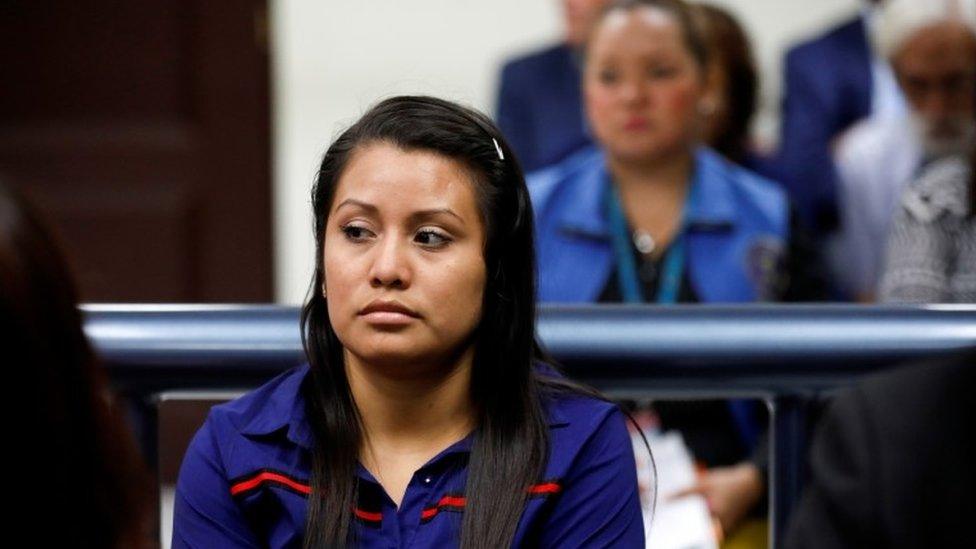
- Published16 February 2019
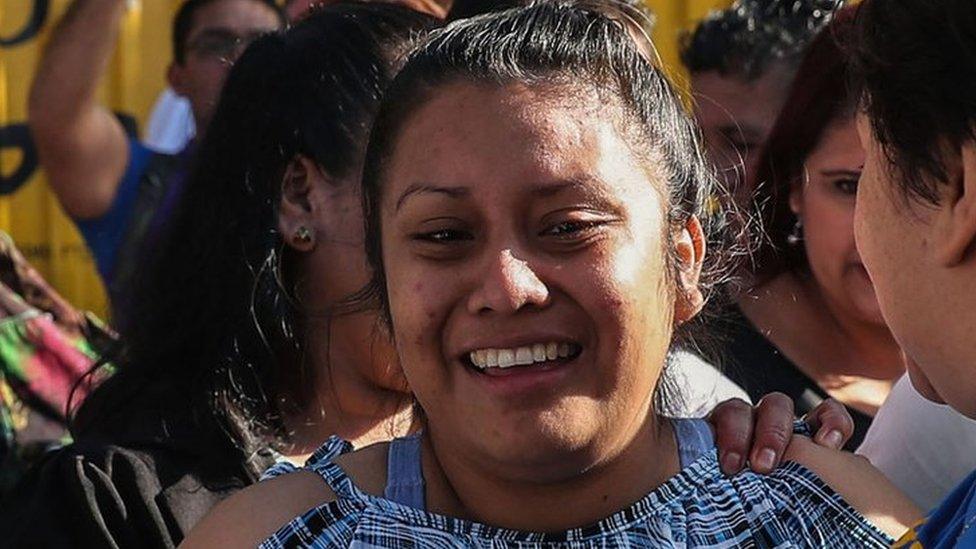
- Published7 July 2017
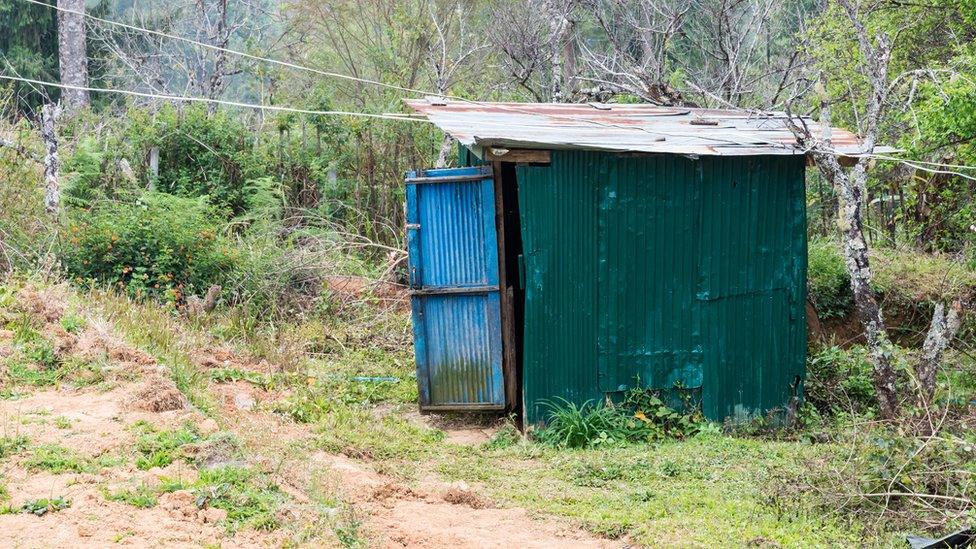
- Published28 April 2015
